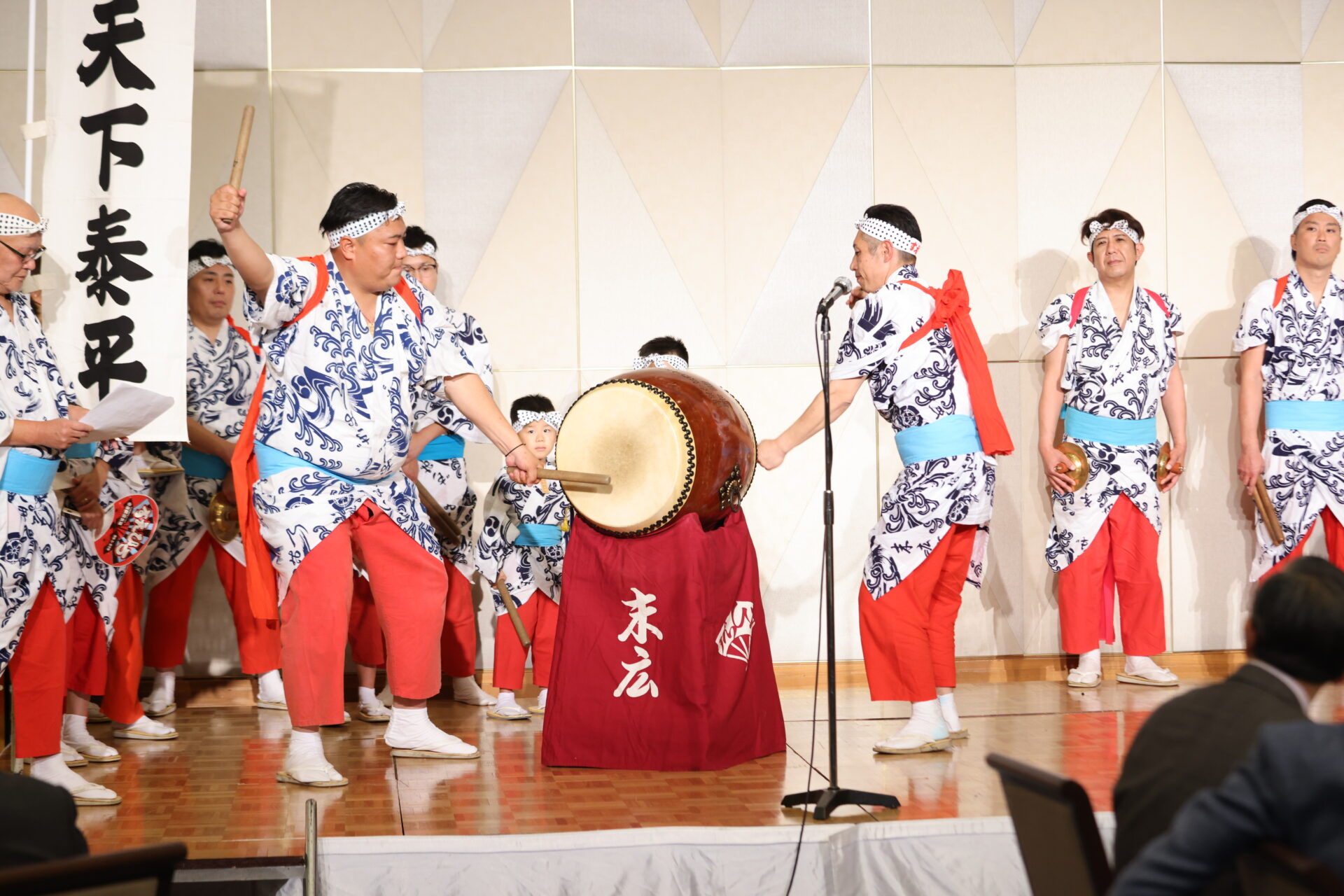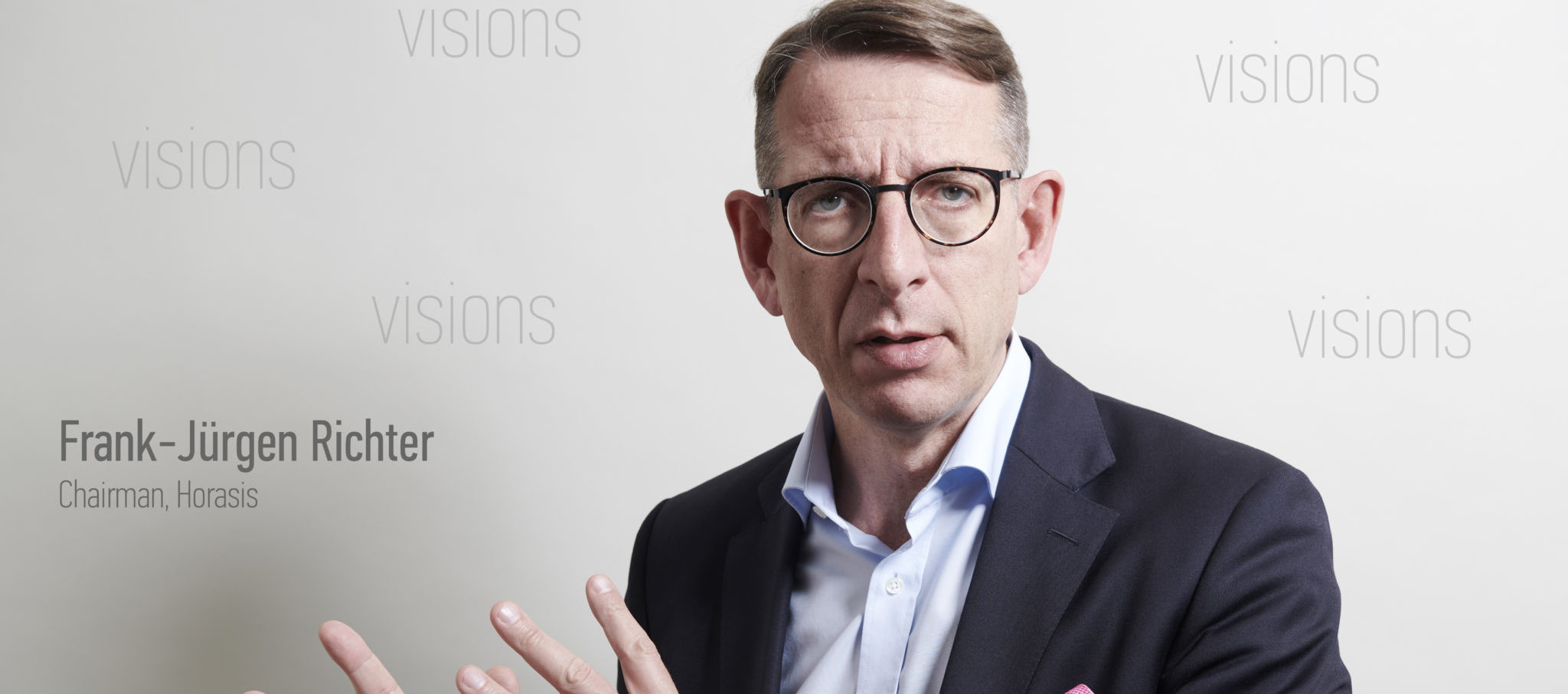Horasis Asia Meeting 2022 – Summary
Horasis convened its annual Horasis Asia Meeting in Kitakyushu, Japan hosted by the City of Kitakyushu. The meeting assembled over 300 members from government, business and civil society. Some of the most senior members of the Horasis community discussed Asia’s future within six plenaries, 26 panel discussions, and frequent informal meetings. Further, delegates debated how Kitakyushu might act as an exemplar for the greening of Japan and elsewhere round the world, thus building upon its own strong revitalization over the past decades. The city is an emblem, not only of addressing pollution, but a striking example of how to eradicate it, as explained by Kenji Kitahashi, Mayor of Kitakyushu, Japan during the Opening.
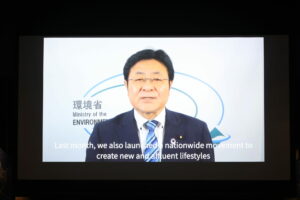
Akihiro Nishimura, Minister of the Environment, Japan
The Horasis Asia Meeting has become the foremost annual meeting for Asia Pacific business leaders and their global counterparts. The event offers businesses and government officials a platform to discuss a wide range of issues related to the economy. The location of the meetings rotated annually and has been held in Bangkok, Thailand (2016), Kolkata, India (2017) and Binh Duong New City, Vietnam (2018, 2019), but the COVID epidemic forced a digital delivery mode in 2020 and 2021. Given the global relaxation of COVID travel restrictions, Horasis has taken the opportunity to renew the 2022 Asian in-person meeting in Kitakyushu, Japan. Its focus remains upon Asia presenting a systemic view of activities affecting the drivers of Asia’s economic success and how Asian businesses interact regionally as well as globally.
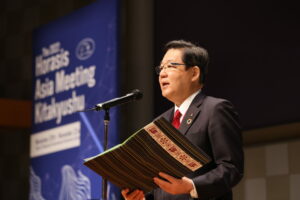
Kenji Kitahashi, Mayor of Kitakyushu, Japan
Miki Ebara, Chief International Correspondent, NHK World, Japan chaired the first plenary and focused on the meeting’s theme, stating Asia’s flux contains many difficult elements, beginning with its share of COVID being carried by developing nations as well as China. The latter continues to pursue a policy of Zero-COVID and suffers continuing outbreaks of the malady and ensuing lockdowns which disrupt local life, local production and ultimately the global economy. Richard David Hames, Chief Strategist, Eternus Group, Australia noted that when increasing complexity we generate conditions in which society finds it almost impossible to think of viable alternatives to the status quo and, as a consequence, we defer action indefinitely, so we face the possibility of societal collapse. Japan has increased its international discussions recently in terms of defense alliances, but it carries its own long-term economic issues. Ken Shibusawa, Chief Executive Officer, Shibusawa and Company, Japan thought his country is in a unique position globally with respect to its management of inflation and its elaboration of capitalism. But its management is made more difficult by the confluence of world events. And these events were further mentioned by Preity Üpala, Founder, The Omnia Institute, India, agreeing there is much to worry about, especially with respect to the world’s mutual dependence on China. This makes it difficult for the rest of the world, as China seems to be exporting debt. Presenting a slightly different view, yet still focusing on the Asian nations’ agreements, Michael Yeoh, President, KSI Strategic Institute for Asia Pacific, Malaysia noted how Malaysia could pursue ‘middle power diplomacy’ being beneficially geo-located and well connected within ASEAN and other Pacific trade and political groups.
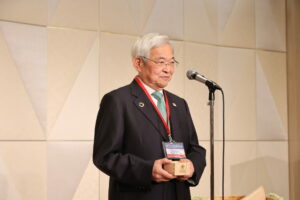
Ryosuke Shojima, Vice Governor, Fukuoka Prefecture, Japan
Following on, Girish Ramachandran, President Asia Pacific, TCS, Singapore, chairing plenary on the SDGs, noted how Asia is becoming a center for firms to consider how to future proof their business – and posited “what better way than to embrace SDGs?” Agreeing, Tove Kinooka, Director and Co-Founder, Enteleco, Japan quoted surveys that over 50% firms state they engage in SDG activity and top management is the biggest driver. “We must ensure it is effective”, she insisted. Which was agreed by Nguyen Quang Huan, Chairman, Halcom, Vietnam who emphasized we must not focus on profit alone – but be responsible to our staff and our broad client base. This led well into the contribution by Tadahiro Kaneko, Deputy Head of Sustainability, Sumitomo Mitsui Financial Group, Japan who stressed that empowering local processes and stakeholders are as important as international cooperation to localize the context of circular economy in the context of ESG. Finally, Joichi Ito, Co-Founder, Board Member, Chief Architect, Digital Garage, Japan stated we have to consider the rebuilding of economies ‘like a garage’ of businesses – adding IT, market tech, and FinTech as building blocks. And ensuring that afterwards we nurture the rebuilt firms.
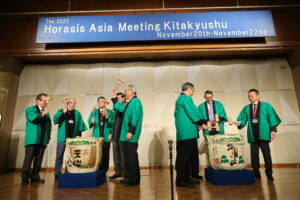
Sake Barrel Ceremony “Kagami-Biraki”
At dinner on the first evening delegates heard Junji Tsuda, President, Kitakyushu CCI, Japan describing the opening of the ‘robot village’ in which exhibitors at Kitakyushu would engage with the public to consider the relationships between robots and the public. Apart from the obvious development of business links and application’s development it is hoped the village would foster industrial tourism still further. Ryosuke Shojima, Vice Governor, Fukuoka Prefecture, Japan noted that Fukuoka enjoys a reputation as one of the fastest-growing startup hubs in Japan, offering a series of support initiatives for those starting up a business in the city – so is bringing together cutting-edge technology, innovative thinkers and sustainable practices. The area has developed since 2018 when Fukuoka City signed a memorandum of understanding with the World Bank to collaborate with its City Partnership Program on the themes of ‘sustainable and livable city planning’ and ’competitive cities’. Since then he said, we have been collaborating with the World Bank on urban issues including aging and solid waste management, as well as city planning including transit-oriented development and smart cities. Using our knowledge, we will contribute to tackling urban challenges in developing countries.
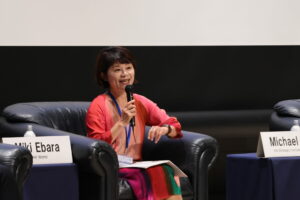
Miki Ebara, Chief International Correspondent, NHK World, Japan
Next morning, during the Grand Opening, Akihiro Nishimura, Minister of the Environment, Japan said that Japan is promoting a Green Transformation and will introduce carbon pricing soon, in line with Paris 2015, and within the accords of COP27: they were expecting 150 trillion-yen ($1 million) investment over next 10 years, including public/private partnerships. He stressed it is imperative Japan and all nations reduce their emissions to limit to 1.5C the rise in global temperature. Towards this goal, pan-Asian investment in carbon-neutrality will be $40 trillion by 2050. In particular, Kitakyushu is taking a lead to maximize its use of renewables, and recycling. Kitakyushu is also committed to city-to-city collaboration in Japan and overseas. He hoped this Horasis meeting would extend sustainable growth everywhere. Hiroshi Komiyama, President, Kitakyushu Asian Center for Low Carbon Society, Japan thanked his Minister and reiterated that in 2020, the City of Kitakyushu joined the national government in announcing its intention to become a zero-carbon city, aiming to achieve a decarbonized society (zero greenhouse gas emissions as a whole) by 2050. He emphasized pollution is a major issue across Asia, and globally. To aid progress, the city has expanded its research, and their solutions are applicable globally to counteract climate change.
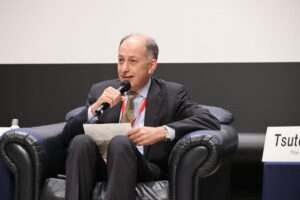
Meeting co-chair Naushad Forbes, Co-Chairman, Forbes Marshall, India
The plenary concerning the Asian Economic Outlook reviewed the effect that the Russian war in the Ukraine was having upon Asia, and what may be done to alleviate its pressure. As many supply chains originate in China, global growth remains precarious, and nations worldwide are considering near- or re-shoring their once dispersed manufacturing. But their change of policy is difficult, even if desired by governments and Boards alike – they have stringent cash limits due to combating inflation following the COVID pandemic and now the disruption in food and fuel distribution following the Russian war. Bernard Yeung, President, Asian Bureau of Finance and Economic Research, Singapore chaired this plenary and suggested that Hong Kong and Singapore ought to be viewed as collaborators in the financial and political space which might solve some of the concerns of CEOs. Broadly, addressing more general issues, he opined that we must practice critical thinking in reading media reports on the two cities to judge multiple perspectives to arrive at a balanced judgment. ‘Time is short’ suggested Roger King, Founder and Chairman, ODS Holdings Inc., Hong Kong. It will be worrying if global leaders procrastinate – there is too much to do. But there are no shortcuts – we must work hard and focus on clear visions within an Asian context. Continuing that line of thought, Alejandro Reyes, Professor, University of Hong Kong, Hong Kong stressed we must develop education, especially the higher education sector that has to address how to develop innovation and entrepreneurship as a rounded concept. Better education and critical thinking would be of help agreed Santosh Kaveti, Chief Executive Officer and Founder, ProArch, Singapore who urged leaders to be innovative as it is the skill of the future. It is something he has to engage in constantly to operate ProArch in these turbulent times, as well as pressing for greater sustainability. And those ideals would aid the Caspian Sea Region to develop a joint social sustainability initiative said Murat Seitnepesov, Chairman, Caspian Week, Switzerland. Through this he thinks that higher visibility will lead to improved relations between the Caspian Sea Region countries and those further afield to benefit business, education, science, and cultural relations.
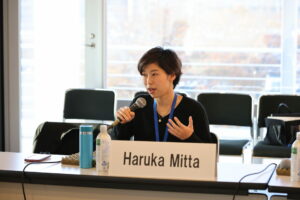
Haruka Mitta, Artist, Japan
Charles Tang, President, Brazil China Chamber of Commerce, Brazil chaired a plenary session on Asia and its diversity, accepting Asian diversity and he explained how he has incorporated his own diverse background into his present activities – saying if he can do this for the bi-lateral Brazil-China programme surely others can do this within the wider Asian region. Bo Inge Andersson, Chief Executive Officer, Uzauto Motors, Uzbekistan followed up stating, in a sense, one must turn diversity into a common purpose. As an example, he asked delegates to consider his personal people-centered approach – questioning if his firm is being fair, do his staff give a fair-days’ work, do suppliers and his production operations work sustainably? Claire Chen, Managing Partner, SZLT-iSource Consulting Group, Taiwan added that for all these questions we need data to make fair judgements, and if aspects are not working, we need to change them quickly. Asia must learn how to work fairly – with large richer nations and firms helping their small companions. Following on, Kobsak Chutikul, Advisor, Senate Foreign Relations Committee of Thailand, Thailand agreed are many difficulties and pressures across Asia – as noted in the recent APEC meeting endorsing the Bangkok Goals of a Bio-Circular-Green Economy to lead to a balanced, sustainable and inclusive development. In the short term, in this turbulent time, poorer nations may not be helped sufficiently by richer nations. ‘We need tp pursue coordinated public policies to boost growth all over Asia,’ Yoshito Hori, Founder and Chairman, Globis, Japan concluded.
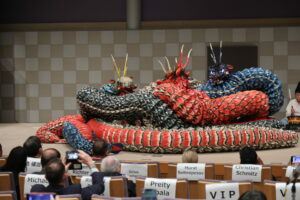
Snake Dance
The plenary series were closed with a discussion on climate change – how could we meet our goals? Naushad Forbes, Co-Chairman, Forbes Marshall, India remained pessimistic about India swiftly managing change – stating it does not implement internally changes rapidly via its budget promises, so why ought it to do this international to solve climate change. Yet, public/private partnerships were becoming more frequent and at scale – so perhaps businesses are taking account. Critically, Sinartus Sosrodjojo, Co-founder, Füllen, Indonesia said, Asia needs to invest more in research, be more innovative and more independent. Yet, over all, energy supply remains an issue for businesses. Tatsuo Hatta, Chairman of Executive Board, Asian Growth Research Institute, Japan pointed out, that if productivity grows, it makes up for low population growth – initially a Japanese difficulty, but now a global problem with the current world-wide reduction in birthrates. It is important to focus on the high potential for growth that the Japanese economy has, added session chair Tsutomu Ishiai, Senior Staff Writer, The Asahi Shimbun, Japan. According to Vivian Claire Liew, Climate Alpha Advisor to SWFs & Institutions, Singapore, removing obstacles to the natural flow of resources is called “structural reform,” and in most Asian countries there is great opportunity for structural reform. But the world – as COP27 has shown – is slow to engage in tackling climate change, concluded Isabella Qin, Vice Chair, United Nations Association UK Young Professionals Group, United Kingdom.
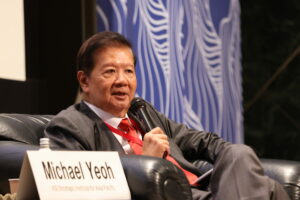
Michael Yeoh, President, KSI Strategic Institute for Asia Pacific, Malaysia
The meeting was concluded with a special message from the mayor of Kitakyushu who discussed and explained their realization of a Green Society. Kenji Kitahashi, Mayor of Kitakyushu, Japan noted his city is located on Kyushu Island and was one of Japan’s biggest manufacturing sectors in the 1960s. This created problems of air and water pollution, causing its Dokai Bay to be called the “Sea of Death”. Following its realization of its own pollution there were many green initiatives beginning with women’s associations standing up for their children and families: the environment recovered remarkably and was awarded the title of “Gray City to a Green City”, to lead the globe by example. The city was awarded the Global 500 Award from the United Nations Environment Programme in 1990, and Local Government Honors at the Earth Summit in 1992. With other initiatives that have been recognized both in Japan and overseas, including its selection by OECD as a Green Growth City; and by the Japanese government as an Eco-Model City, Future City, and SDGs Future City. The Kitakyushu Green Frontier Plan is a plan that can be copied across the globe, leading to the Paris 2015 climate change goals. In conclusion, Kitakyushu’s history is one that involves a diverse set of stakeholders, including industries, government, academia, and the public from the time it was active in overcoming pollution (1960s) to today, and in promoting urban development with the participation of all members of society. Going forward, Kitakyushu will continue to develop together with various stakeholders, as it aims to become a new frontier for the SDGs.
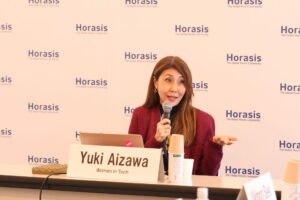
Yuki Aizawa, Malaysia Country Director, Women in Tech, Malaysia
During the closing dinner, J.T. Li, Professor, The Hong Kong University of Science and Technology, Hong Kong, thanked participants and the City of Kitakyushu on behalf of the Horasis Community. He also commended delegates to support the power of innovation to face a potential global economic crisis. Frank-Jürgen Richter, Chairman, Horasis, Switzerland closed the meeting – thanking all the delegates and in particular the host city Kitakyushu, its mayor, and others who have aided the meetings progress. He concluded that the 7th Horasis Asia Meeting has illustrated how cooperation between the Asian nations, indeed all nations and their businesses, can develop synergies for the future. He called on the Horasis Global Community to maintain a worldwide impetus moving to solve future problems and develop future harmonies.

